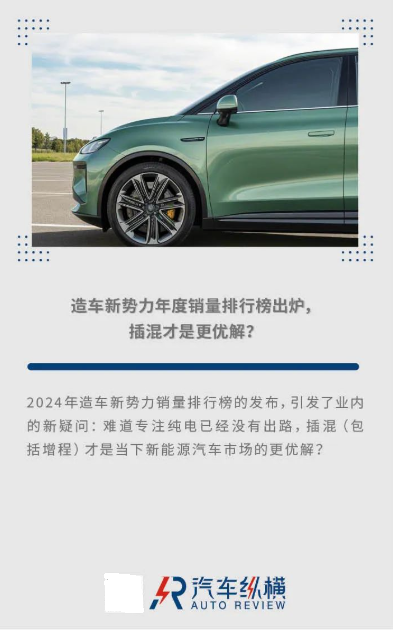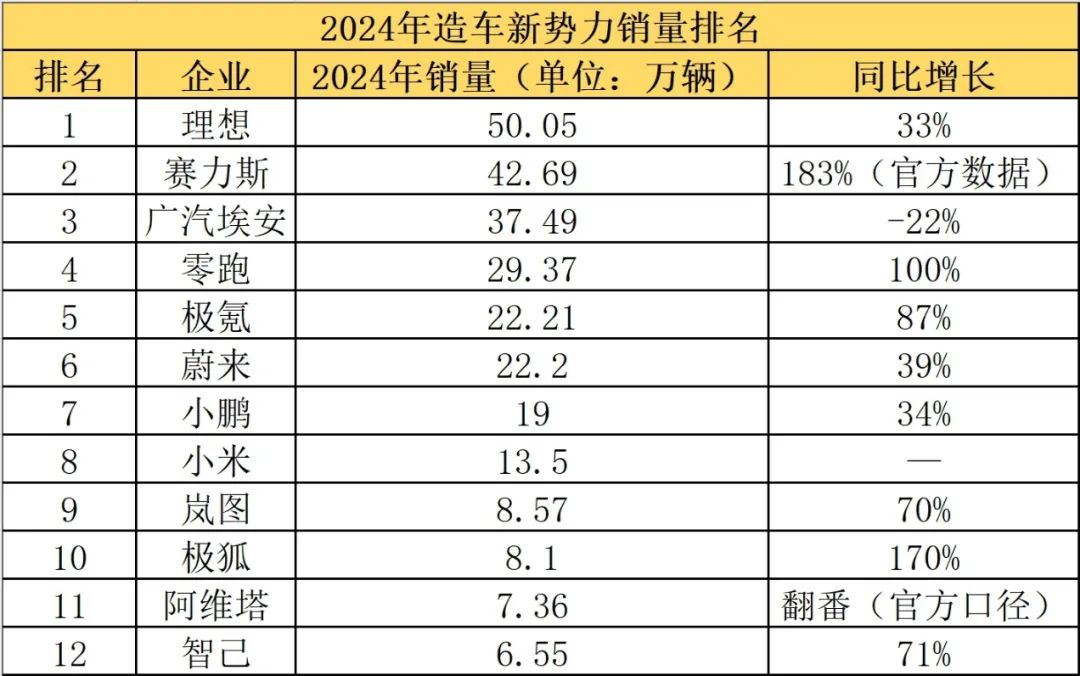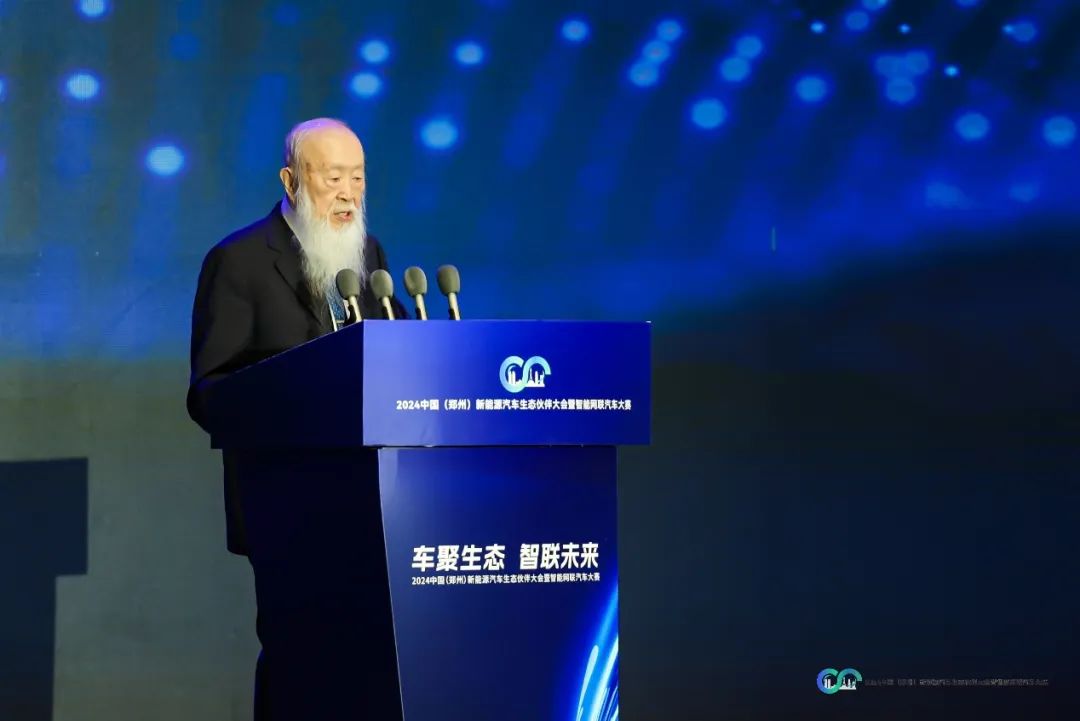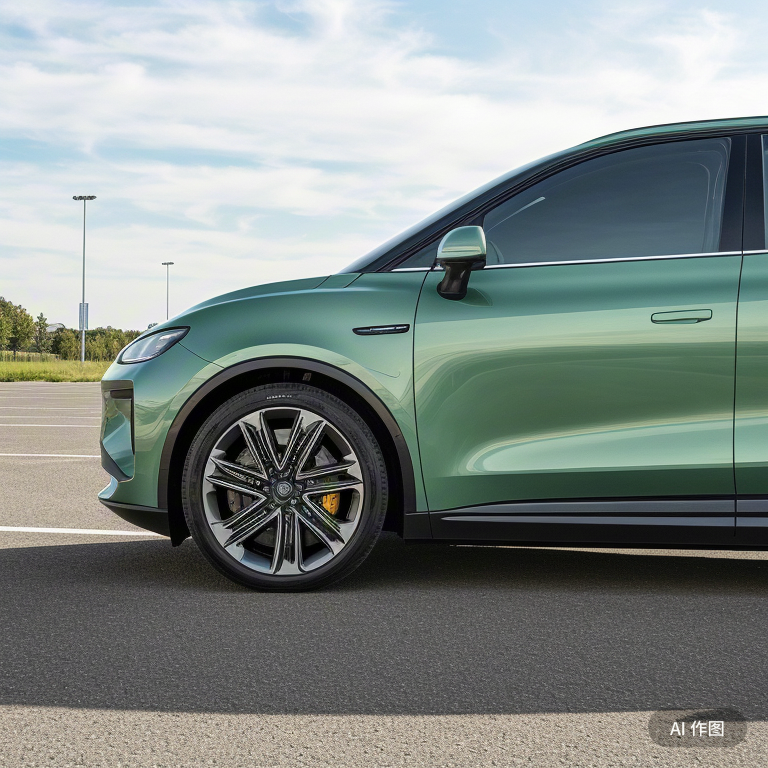Annual Sales Ranking of New Carmakers Revealed: Is Plug-in Hybrid the Superior Solution?
![]() 01/13 2025
01/13 2025
![]() 567
567

As the new year dawned, new carmakers unveiled their 2024 'report cards'. Unsurprisingly, Li Auto led the pack with sales exceeding 500,000 units, followed closely by Thalys with 426,900 annual deliveries. GAC AION secured third place, while NIO and XPeng, once known as the 'NIO, XPeng, Li Auto' trio, fell out of the top 5. Intriguingly, the 2024 sales ranking has sparked a debate among industry insiders: Is the focus on pure electric vehicles waning, and is plug-in hybrid (including extended-range) the better strategy for the current new energy vehicle market?

(Chart: Auto Review, Data Source: Public Networks)
No Plug-in Hybrid, No Top Spot?
At first glance, almost all carmakers atop the sales ranking have 'bet' on plug-in hybrid technology, with Li Auto, a pioneer in the extended-range segment, dominating the top spot for two consecutive years. Official data reveals that Li Auto's main extended-range models, Li L6, L7, L8, and L9, contributed to cumulative sales of 500,508 units in 2024, outperforming other new forces and rivaling BBA in the segmented market. Li Auto's first pure electric model, Mega, launched last March, had a modest impact on overall sales.
Thalys, ranking second in sales, also adopted the extended-range technology for its mainstream products. Thalys achieved cumulative sales of 426,900 units in 2024, a 182.84% increase from the previous year. Notably, the AITO M7, an extended-range hybrid model, delivered 195,900 units throughout the year, making it the sales champion among new forces' single models.
Leap Motor also witnessed rapid sales growth in 2024, delivering a total of 293,700 new vehicles, a year-on-year increase of approximately 100%. Not only did it surpass its annual delivery target of 250,000 units ahead of schedule, but it also set a sales target of 500,000 units for 2025. Some analysts attribute Leap Motor's turnaround to its 'extended-range' strategy. Leap Motor faced an existential crisis two or three years ago but rebounded after launching its first extended-range models, the Leap Motor C11 Extended Range version in March 2023 and the Leap Motor C01 Extended Range version six months later. Sales in 2023 surged 29.7% year-on-year to 144,155 units, and in 2024, Leap Motor entered the top five of new carmakers.
AITO is another noteworthy mention. Although lower on the ranking list, AITO has delivered over 10,000 units for three consecutive months since launching the AITO M7, with 11,067 units delivered in December 2024. Coincidentally, the AITO M7 is AITO's first model to adopt extended-range power, with sales of 5,636 units and 8,398 units in October and November, respectively.
In contrast, NIO and XPeng, which adhered to the pure electric route or still focused on pure electric products in 2024, fell out of the top 5. GAC AION, ranking third, is the only new carmaker on the list with negative year-on-year growth. This has led some industry insiders to believe that plug-in hybrid technology, represented by extended-range, is a better choice for the current new energy vehicle market.
Plug-in Hybrid (Including Extended-Range) Models Grow by Over 80%
The saying 'question extended-range, understand extended-range, become extended-range' is becoming a reality. Once dismissed as 'outdated' or 'transitional,' the extended-range technology route is now increasingly crowded as the market expands. Statistics show that out of 130 new energy vehicle models launched in the first 11 months of 2024, 69 were pure electric, 45 were plug-in hybrid (excluding extended-range), and 16 were extended-range.
Since the second half of last year, automakers like XPeng, Zeekr, GAC AION, IM Motors, and others have announced plans to launch extended-range vehicles. Even Xiaomi, a newcomer to the market, is rumored to adopt extended-range technology for its third product. On October 24, CATL released the XiaoYao Super Extended-Range Battery, currently used in Li Auto, AITO, ARCFOX, QIYUAN, and NIO, and will be featured in nearly 30 extended-range models from brands like Geely, Chery, GAC, VOYAH, and IM Motors in the future.
'It's nonsense to say that extended-range electric vehicles are not advanced enough,' said Yu Chengdong, Executive Director of Huawei and Chairman of the Intelligent Automobile Solutions BU, at the launch of the AITO M7. Yang Yusheng, academician of the Chinese Academy of Engineering, echoed this sentiment at the 2024 China (Zhengzhou) New Energy Vehicle Ecosystem Partner Conference, stating that 'extended-range is not a transition to pure electric vehicles, but the main force of future vehicles.' He argued that extended-range vehicles offer long range, energy conservation, emission reduction, and high safety, and their recent popularity in China's electric vehicle market is due to the end of national subsidies, pushing the industry into a market-oriented stage where cost-effectiveness becomes crucial.

The market landscape of new energy vehicles has shifted. Data from the China Association of Automobile Manufacturers shows that from January to November 2024, China's new energy vehicle sales reached 11.262 million units. Among them, sales of plug-in hybrid models (including extended-range) were 4.519 million units, with a year-on-year growth rate of 85.2%, while sales of pure electric models were 6.738 million units, with a year-on-year growth rate of only 15%. Clearly, plug-in hybrid models (including extended-range) have outpaced pure electric vehicles in market growth rates.
Pure Electric and Plug-in Hybrid Will Coexist and Develop
Amid the sudden rise of plug-in hybrids (including extended-range), pure electric vehicles may seem overshadowed. However, as Li Bin, founder, chairman, and CEO of NIO, stated at the year-end media communication meeting, 'The growth rate of pure electric vehicles is slower, but their volume is already larger. I am very confident in pure electric vehicles. I believe that ultimately, pure electric will definitely be the ultimate solution, and we have always adhered to the route of 'chargeable, replaceable, upgradable.'
Considering the overall market landscape of new energy vehicles, both now and in the future, pure electric vehicles will coexist and develop alongside plug-in hybrids (including extended-range). Even if, as predicted by Zhang Yongwei, Vice Chairman and Secretary-General of the China Electric Vehicle Hundred People Forum, the proportion of plug-in hybrids and extended-range vehicles in the new energy vehicle market approaches 50% in 2025, the other 50% will still be occupied by pure electric vehicles.

It's worth noting that while some new carmakers have achieved rapid sales growth through extended-range vehicles, this technology route is not a 'panacea.' For instance, after Neta launched its first extended-range vehicle, the Neta S Extended Range version, sales fell short of expectations, peaking at just over 2,000 units per month for the entire lineup. Similarly, the subsequently launched extended-range SUV, the Neta L, also underperformed. In contrast, Zeekr, which only had pure electric products in 2024, achieved cumulative sales of 222,000 units throughout the year, a year-on-year increase of 87%. Xiaomi also quickly gained market share with pure electric products, reaching monthly sales of 20,000 units.
In fact, automotive technology routes have never been an either-or situation. New energy automakers with sufficient resources can adopt a 'two-legged' approach. For example, Li Auto, a pioneer in the extended-range technology route, launched its first pure electric vehicle in 2024. Other new energy automakers have also chosen to simultaneously deploy pure electric and extended-range routes, offering two versions of some models for consumer choice.
Technology continues to advance, and the industry moves forward. It's premature to determine whether pure electric or plug-in hybrid will ultimately prevail. For new carmakers in this fiercely competitive market, a diversified layout may be the key to success.
Images: From the Internet
Article: Auto Review
Typesetting: Auto Review








